
 i_need_contribute
i_need_contribute

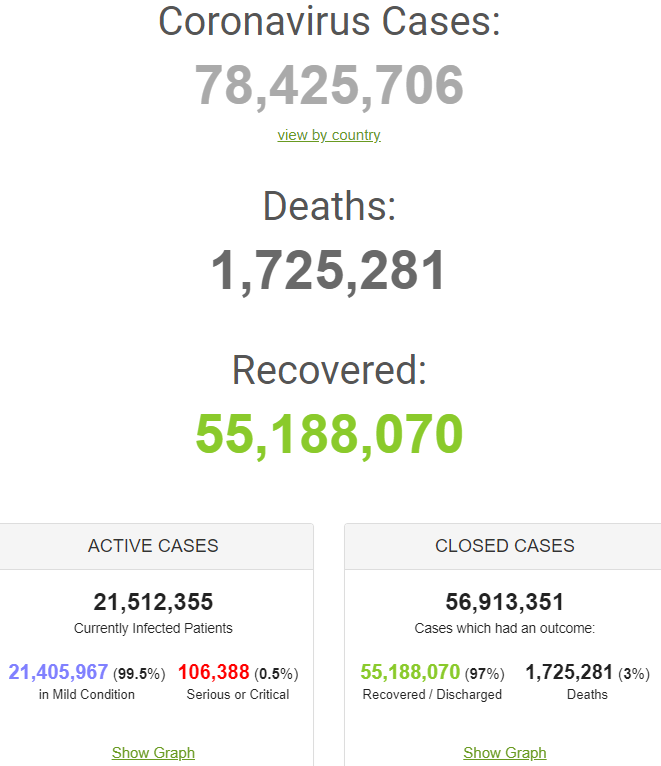
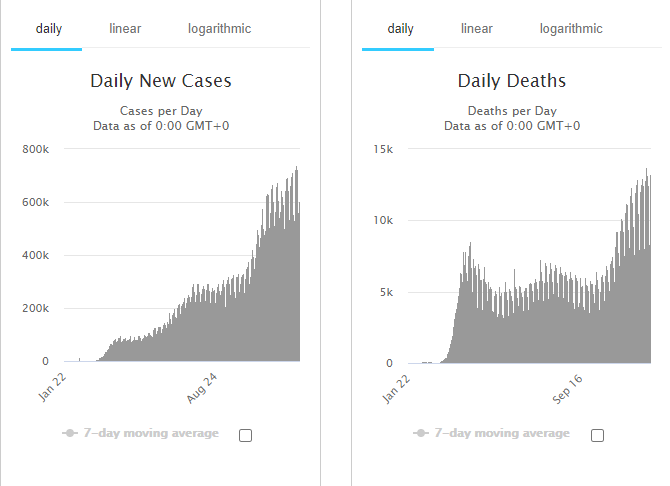
|
Country, |
Total |
New |
Total |
|
World |
78,346,518 |
+605,029 |
1,722,948 |
|
18,684,628 |
+199,080 |
330,824 |
|
|
10,099,308 |
+23,886 |
146,476 |
|
|
7,320,020 |
+55,799 |
188,285 |
|
|
2,906,503 |
+28,776 |
51,912 |
|
|
2,490,946 |
+11,795 |
61,702 |
|
|
2,110,314 |
+36,804 |
68,307 |
|
|
2,062,960 |
+19,256 |
18,602 |
|
|
1,977,370 |
+13,318 |
69,842 |
|
|
1,838,654 |
+8,544 |
49,520 |
|
|
1,556,611 |
+22,495 |
28,241 |
|
|
1,555,279 |
+8,141 |
42,254 |
|
|
1,530,593 |
+12,526 |
40,931 |
|
|
1,325,915 |
+5,370 |
118,598 |
|
|
1,214,525 |
+7,192 |
25,783 |
|
|
1,170,743 |
+6,208 |
54,003 |
|
|
1,000,153 |
+1,678 |
37,218 |
|
|
979,506 |
+8,513 |
16,897 |
|
|
940,212 |
+9,501 |
25,246 |
|
|
710,683 |
+9,810 |
10,633 |
|
|
678,125 |
+6,347 |
20,257 |
|
|
635,491 |
+7,926 |
10,613 |
|
|
626,911 |
+981 |
18,697 |
|
|
598,792 |
+5,009 |
14,636 |
|
|
589,189 |
+1,701 |
16,217 |
|
|
586,503 |
+1,158 |
12,725 |
|
|
521,509 |
+6,195 |
14,425 |
|
|
503,501 |
+1,318 |
7,329 |
|
|
462,808 |
+1,307 |
9,021 |
|
|
460,672 |
+1,704 |
9,474 |
|
|
420,648 |
+2,646 |
7,030 |
|
|
382,487 |
+4,228 |
3,136 |
|
|
378,656 |
+2,436 |
6,254 |
|
|
361,359 |
+181 |
6,139 |
|
|
342,226 |
+1,853 |
5,540 |
|
|
307,827 |
+4,080 |
2,782 |
|
|
306,368 |
+1,238 |
8,462 |
|
|
279,892 |
+2,444 |
3,627 |
|
|
255,236 |
+722 |
1,798 |
|
|
217,202 |
+3,164 |
3,632 |
|
|
212,526 |
+3,064 |
2,182 |
|
|
206,364 |
+35 |
13,949 |
|
|
205,877 |
+2,284 |
2,294 |
|
|
200,658 |
+2,135 |
2,944 |
|
|
197,323 |
+1,595 |
3,328 |
|
|
195,878 |
+1,226 |
642 |
|
|
194,271 |
+1,799 |
6,879 |
|
|
177,274 |
+1,858 |
1,341 |
|
|
Dominican |
161,930 |
+878 |
2,398 |
|
160,979 |
+1,693 |
1,311 |
|
|
160,804 |
+911 |
2,051 |
|
|
155,218 |
+2,663 |
1,618 |
|
|
154,602 |
+537 |
2,673 |
|
|
150,385 |
+362 |
9,043 |
|
|
148,507 |
+298 |
923 |
|
|
147,975 |
+739 |
2,196 |
|
|
142,308 |
+149 |
243 |
|
|
140,175 |
+2,543 |
1,070 |
|
|
136,931 |
+1,021 |
2,803 |
|
|
133,601 |
+734 |
4,718 |
|
|
132,430 |
+833 |
4,340 |
|
|
128,143 |
+212 |
1,490 |
|
|
127,061 |
+788 |
7,167 |
|
|
125,506 |
+1,561 |
1,198 |
|
|
123,323 |
+1,605 |
4,237 |
|
|
120,638 |
+290 |
1,864 |
|
|
117,946 |
+964 |
2,484 |
|
|
117,190 |
+168 |
3,034 |
|
|
116,357 |
+1,870 |
1,093 |
|
|
110,828 |
+315 |
997 |
|
|
107,805 |
+1,509 |
2,418 |
|
|
101,544 |
+932 |
2,120 |
|
|
97,389 |
+2,062 |
439 |
|
|
96,069 |
+410 |
2,687 |
|
|
95,706 |
+506 |
1,385 |
|
|
94,768 |
+154 |
1,647 |
|
|
90,634 |
+184 |
350 |
|
|
86,867 |
+15 |
4,634 |
|
|
81,228 |
+961 |
2,171 |
|
|
79,789 |
+999 |
1,231 |
|
|
79,429 |
+175 |
1,335 |
|
|
79,190 |
+756 |
2,340 |
|
|
76,180 |
+132 |
612 |
|
|
58,461 |
+29 |
29 |
|
|
53,814 |
+389 |
1,111 |
|
|
51,458 |
+867 |
722 |
|
|
44,932 |
+596 |
405 |
|
|
44,809 |
+227 |
453 |
|
|
44,542 |
+258 |
637 |
|
|
5,669 |
+86 |
118 |
|
|
5,199 |
+23 |
47 |
|
|
1,420 |
+6 |
35 |
Retrieved from: https://www.worldometers.info/coronavirus/
From CNN's Amy Cassidy in Glasgow, Zamira Rahim and Naomi Thomas
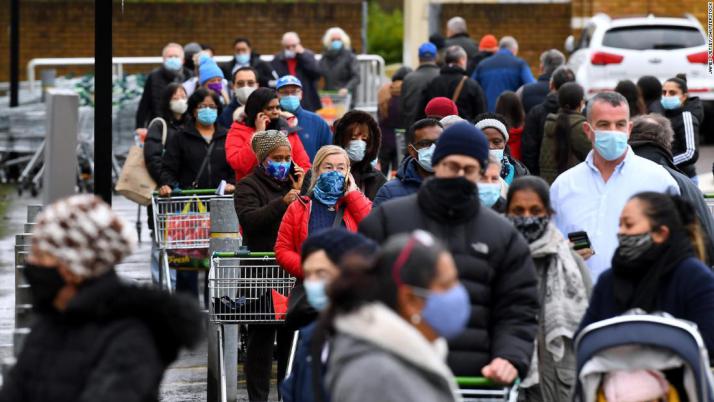
Scientists from the UK’s New and Emerging Respiratory Virus Threats Advisory Group (NERVTAG) say they are now “highly confident” the new variant of coronavirus is more infectious than others, with a “hint” that it could be more transmissible in children.
According to NERVTAG, the new variant -- which is believed to have originated in southeast England -- could be around 71% more transmissible than other variants.
“As of last Friday, we felt we had moderate confidence because the data was coming in, but some of the analysis had been done very quickly,” Peter Horby, professor of emerging infectious diseases at the University Oxford and chair of NERVTAG, said during a virtual news briefing on Monday.
“We now have high confidence that this variant does have a transmission advantage over other virus variants that are currently in the UK,” he added.
Speaking alongside Horby, Professor Neil Ferguson from Imperial College London noted that there is a “hint” that this variant “has a higher propensity to infect children,” compared with earlier strains. But he cautioned that “we haven’t established any sort of causality on that, but we can see that in the data,” he added.
Another NERVTAG member, Wendy Barclay, head of the Department of Infectious Disease at Imperial College London, said earlier strains of the virus may have had a “harder time” getting into human cells using a receptor called ACE2. Adults, who have a lot of this receptor in their noses and throats, are “easy targets” compared to children. But under this hypothesis, a virus that can more readily use this receptor to enter cells may make children just as susceptible to the virus as adults, she said.
According to the US Centers for Disease Control and Prevention, some research suggests the UK strain may "bind more tightly” to the ACE2 receptor, but "it is unknown whether that tighter binding, if true, translates into any significant epidemiological or clinical differences.”
From CNN's Sharon Braithwaite
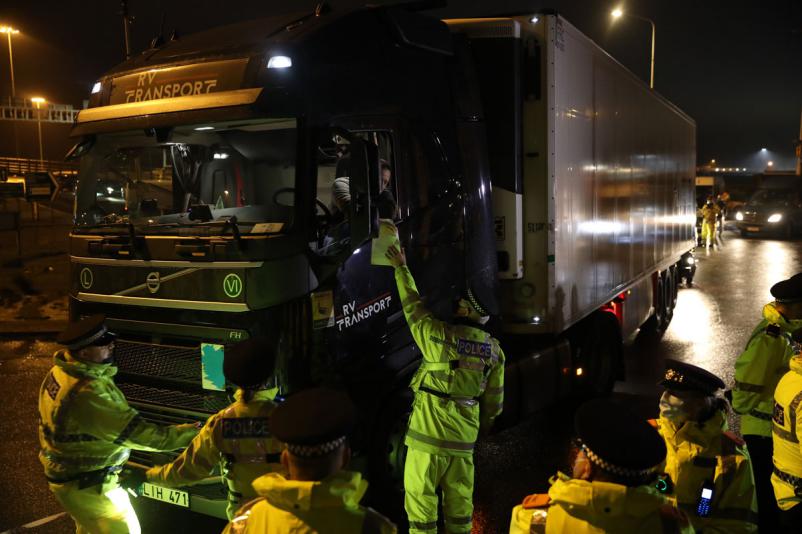
Police officers direct lorry drivers at the Port of Dover on December 23 in Dover, United Kingdom. Dan Kitwood/Getty Images
UK Housing Secretary Robert Jenrick hopes that a vehicle pile-up at the country's border with France can be resolved soon, he told Sky News on Wednesday.
France and the United Kingdom have agreed to reopen their border -- closed due to fears of a new variant of the coronavirus detected in the UK -- but with strict stipulations including that those crossing must have tested negative for Covid-19 in the previous 72 hours.
"We have had productive discussions over the last 24/48 hours," Jenrick said. "They have reached what seems like a sensible way forwards. There's going to be quite a lot of work to do in the next few days and this isn't going to be an issue that will be resolved immediately ... I wish events hadn't played out in the way they have but, but they have, we now have to move on and ensure that traffic can flow as quickly as possible across the Channel."
Jenrick added he hoped that "this morning, you'll see people and HGVs (heavy goods vehicles) crossing the Channel."
NHS Test and Trace staff and the military will be deployed for a mass testing program across parts of Kent where thousands of heavy goods vehicles are currently stuck, PA Media reported earlier.
"We're putting in place the infrastructure. So the armed forces will be doing that in the first instance to help us to set that up and to get through some of the (testing) backlog that you've seen, they will then in turn hand over to civilians who will take this forward," Jenrick said.
As of 7 p.m. Tuesday evening, there were almost 3,000 heavy goods vehicles parked at Manston Airport in Kent, and up to 800 more in other areas across the county, Jenrick added.
He cautioned there could be "other HGVs and smaller vehicles are parked elsewhere in Kent because they've chosen not to come into the official operation. So the true number may be slightly higher than that. Whatever the number is, whether it's 4,000 or more, It's a significant number to work through."
From CNN's Yoko Wakatsuki in Tokyo

A man and a woman look at the floating Olympic rings along Tokyo Bay on December 1. Eugene Hoshiko/AP
The opening and closing ceremonies for the delayed Tokyo Olympic Games will be carried out with a "simpler, more restrained approach," the organizing committee announced on Wednesday.
The ceremonies will be designed to "reflect the overall simplification of the Games" with Covid-19 countermeasures in place.
Tokyo 2020 was originally due to take place this summer, but was postponed to next year as a result of the pandemic.
The organizing committee made no announcements about how the ceremonies' formats would be different or modified.
"It is appropriate to make ceremonial events and programs simpler and have them in some way reflect and respect the world's experience of the COVID-19 pandemic," the committee said in a statement. A new team will be convened that will help prepare the events.
The hope is that the ceremonies can be "symbols of the unity and symbiosis of humankind in its overcoming of the COVID-19 pandemic," the statement said.
Retrieved from: https://edition.cnn.com/world/live-news/coronavirus-pandemic-vaccine-updates-12-23-20/index.html
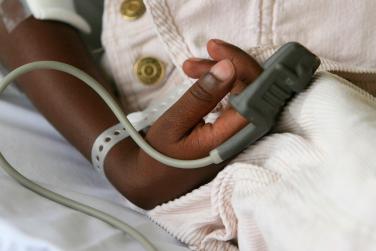
Pulse oximeters detect the amount of oxygen in the blood by shining light through the finger.Credit...BSIP SA/Alamy
Pulse oximeters are among the most commonly used tools in medicine. The small devices, which resemble a clothespin, measure blood oxygen when clipped onto a fingertip, and they can quickly indicate whether a patient needs urgent medical care.
Health providers use them when they take vital signs and when they evaluate patients for treatment. Ever since the pandemic started, doctors have encouraged Covid patients to use them at home.
But in people with dark skin, the devices can provide misleading results in more than one in 10 people, according to a new study.
The findings, published last week as a letter to the editor of a top medical journal, sent ripples of dismay through the medical community, which relies heavily on the devices to decide whether to admit patients or send them home.
The report also stirred concerns because the pandemic is taking a disproportionate toll on Black and Hispanic Americans, drawing attention to racial health disparities and prompting soul-searching among doctors about bias that permeates the practice of medicine. There have been several reports of acutely ill Black patients who sought medical care only to be turned away, and studies have found that African-Americans were hospitalized at higher rates, suggesting delays in access to medical care.
The researchers who conducted the oximeter study said they were surprised by the findings. Though scientific reports of the inaccuracies have been published in the past, they did not receive widespread attention or get incorporated into medical training.
“I think most of the medical community has been operating on the assumption that pulse oximetry is quite accurate,” said Dr. Michael W. Sjoding, an assistant professor of internal medicine at the University of Michigan Medical School and lead author of the new report, which appeared in The New England Journal of Medicine. “I’m a trained pulmonologist and critical-care physician, and I had no understanding that the pulse ox was potentially inaccurate — and that I was missing hypoxemia in a certain minority of patients.”
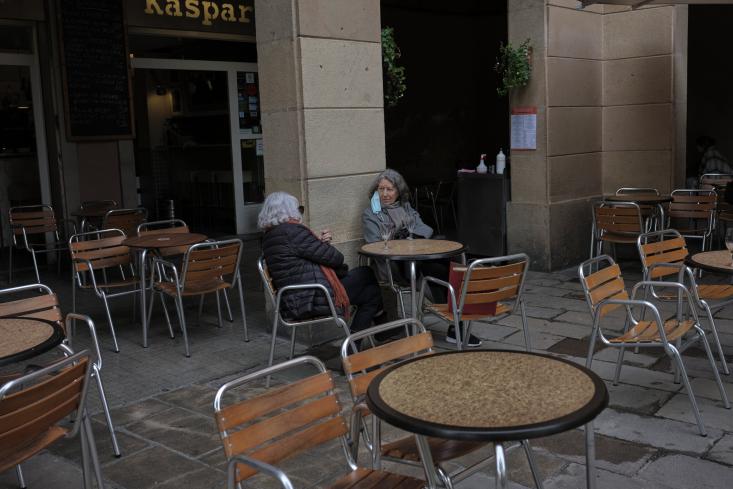
The terrace of a bar in Barcelona earlier this month, after bars and restaurants there were allowed to reopen under strict constraints. The government declared a state of emergency in October.Credit...Samuel Aranda for The New York Times
Spain’s government on Tuesday approved new legislation designed to help owners of bars and restaurants shuttered or crippled by the Covid-19 pandemic.
The legislation, which was passed by decree, will force landlords to reduce the rent by as much as half if they own more than 10 properties used by restaurants and bars in downtown areas.
If needed, owners of restaurants and bars will also be granted a moratorium on the payment of their rent until next May, when Spain’s current state of pandemic emergency is set to expire. The government estimated that as many as 19,000 owners could apply for the rent relief, paying any outstanding rent over the following two years.
But for now, Spain is not offering direct financial aid to its hospitality sector, as many restaurant owners had demanded.
The Socialist-led coalition government also agreed to give further protection to residents facing a possible eviction, by making it illegal for landlords to cut off their electricity or water.
Spain’s state of emergency was imposed in October as a second wave of infections took hold. Restaurants and bars are operating under strict constraints, and a nightly curfew is in effect, as well as travel restrictions in many regions. There have been at least 1.8 million confirmed cases of coronavirus in Spain, according to the Spanish Ministry of Health.
As of Tuesday morning, 49,260 people had died, and the seven-day average of new reported infections was 9,624 cases a day.
Patrick Wintour Diplomatic editor
Poorer countries are unlikely to gain substantial access to Covid-19 vaccines until the latter half of next year, meaning wealthier European countries could still remain vulnerable to new waves of infection for years, the UN’s humanitarian chief has said.
“For poorer countries there will be small quantities of vaccine conceivably in the second quarter of next year, probably not much more than that for a while after that, and it’s 2022 and beyond when the major progress is made,” Mark Lowcock, the under-secretary-general of the UN’s humanitarian agency OCHA, said in an interview. “That is a best judgment, recognising large quantities depend on the number of vaccines authorised, the manufacturing and then the solution the world comes to on who accesses what when.”
Lowcock said that European countries would therefore be “dealing with” the coronavirus in 2022 and probably beyond, even if their economies bounced back in 2021.
“It is highly likely the places where the virus finds it is easier to survive longest will be fragile, conflict-affected states with weak institutions, but the virus can get everywhere,” he said. “It is going to be true that nowhere is safe until everyone is safe because it is a globalised world.
“If this simply becomes a race in which those who are most financially liquid and will pay the most [get first access], then the poorest countries will be at the end of the queue.”
Lowcock said it was understandable that countries that had financed the research and manufacture of vaccines would seek to gain first access, but warned that vaccine nationalism would prove to be counterproductive and self-defeating.
A UN-led vaccine commitment, known as Covax, has managed to secure 700m doses of vaccines to be distributed between the 92 lower-income countries that have signed up, but even so Lowcock said huge problems remained, including the possibility that the focus on a Covid vaccine would divert money and resources away from traditional immunisation programs that he said had the capacity to save more lives.
The former senior British civil servant explained: “You can already see in every developed country it is proving a huge logistical and institutional challenge to cover the population fast enough with the available staff and institutions. That is going to be an even bigger problem in countries which have very weak public health systems.
“Some of these countries are very reliant on NGOs, Unicef or World Health Organization to help implement their immunisation programs so there will be big challenges that go beyond the cold-chain challenges. Reaching inaccessible places, and having the staff to run these programs, that will be a huge challenge.”
He said it may be necessary to carve out special funds from within Covax to ensure that refugees and internally displaced people in humanitarian settings not necessarily covered by a country’s vaccination program received help. He said 1% of the world’s population – 60 million people – were now living in environments where they were not under the control or authority of a government, but instead under the sway of an opposition, extremist or criminal group.
He said that overall Covax was going to have an important mitigating impact, but “we are billions of dollars away from the finances needed to help the countries that would not otherwise be able to access a vaccine. There is a real worry that we are going to see cash transferred to Covax that leads to a shortfall in traditional immunisation programs.”
He said: “There has been a substantial erosion of routine immunisations this year with real consequences for killer diseases such diphtheria and measles from which children have largely been protected in recent years. This year either due to lockdowns or fiscal constraints 80 million children in the second and third quarters of children did not get their immunisation on time. That is a real problem now.”
As former permanent secretary of the UK’s department for international development, Lowcock also challenged the UK government to explain what it intended to cut by reducing the overall size of the British overseas aid programme to only 0.5% of the GDP in 2021, a cut that will slice as much as £5bn out of the £15bn aid programme.
“The UK overseas aid programme has always been well targeted on the world’s poorest countries, and life-saving activities,” he said. “This is going to be a very large cut and I find it hard to think that things that really matter a lot are not going to be affected … A relatively small saving for the UK budget is going to have really quite big implications for the world’s poorest people.”
Retrieved from: https://www.theguardian.com/world/2020/dec/23/delayed-covid-vaccines-for-poor-countries-will-leave-europe-vulnerable-for-years
By Angela Giuffrida in Rome
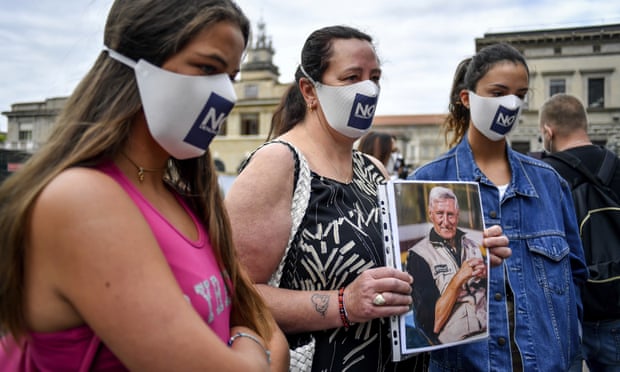
Members of Noi Denunceremo outside the court in Bergamo, Italy, in July. Photograph: Claudio Furlan/AP
Relatives of coronavirus victims in Italy are taking legal action against the prime minister, health minister and the president of the Lombardy region for alleged criminal negligence over their handling of the pandemic.
The group of 500 families will file their civil lawsuit on Wednesday with prosecutors in the Lombardy province of Bergamo, which was badly hit during the first wave of the pandemic. They claim the three leaders – Giuseppe Conte, Roberto Speranza and Attilio Fontana respectively – have contributed to Italy’s almost 70,000 Covid-19 deaths.
The lawsuit focuses on the move by authorities to reopen a hospital in the Bergamo town of Alzano Lombardo, hours after an outbreak occurred there on 23 February – and subsequent failure to immediately quarantine the town, and the nearby town of Nembro, despite advice from scientists in early March.
A crucial element of the legal action will be the alleged absence of an updated national pandemic plan and failure by regional authorities to implement a local plan that was supposed to have been developed from the national one.
Consuelo Locati, the lawyer leading the case, is seeking €259,000 (£235,000) in compensation for each of the 500 families filing the lawsuit.
The legal move is being driven by members of Noi Denunceremo (We Will Report), a group for bereaved relatives that came together in April.
Noi Denunceremo’s committee has so far submitted 300 legal complaints, which detail how some of the victims died, to prosecutors in Bergamo who began an investigation into alleged negligence by the authorities in June.
“The government and region are responsible for violating rules and for dereliction of duties,” added Locati. “The law obliged Italy to have an adequate national plan and for the regional authority to implement an adequate regional plan.”
Locati claims that not only was Italy’s pandemic plan severely outdated, but that it had never been tested to establish if it worked.
“They had no guidelines,” she said. “And even if [the old plan] was implemented it wouldn’t have worked as it lacked a series of steps that should have been followed in order to have been prepared for this pandemic.”
Italy was the first European country to be hit by the pandemic. That its pandemic plan dated back to 2006 was revealed in a report led by the World Health Organization (WHO) scientist Francesco Zambon into the country’s initial response to the coronavirus outbreak. The objective of the report was to provide information to countries that were yet to be affected.
The report was published on the WHO’s website on 13 May but taken down the following day, with all references to it deleted, the Guardian reported in August. The report’s removal allegedly came at the request of Ranieri Guerra, the WHO’s assistant director general for strategic initiatives.
Guerra was the director general for preventive health at the Italian health ministry between 2014 and late 2017, and was therefore responsible for updating the pandemic plan as per new guidelines laid out by the WHO and European Centre for Disease Prevention and Control (ECDC).
Locati claims Lombardy, which has borne the brunt of the pandemic, had a regional plan that was not implemented. “Citizens gave the state and regional government the job of protecting their lives and they didn’t do it,” she said.
Locati, whose father died of Covid-19, added that the goal was not so much the financial compensation but for the authorities to take responsibility. “It might only be one euro, but what that one euro would demonstrate is responsibility and the admission of responsibility,” she said.
Luca Fusco, the president of the Noi Denunceremo committee, said: “The committee sees in this legal action a clear political act, and an attempt to draw a clear line between what is considered acceptable and what must never be acceptable.
“This legal action is our Christmas present to those who should have done [what they were supposed to do], but didn’t, while in Italy, on Christmas Day, there will be 70,000 empty chairs. With adequate planning, as requested over and over again by the EU and the WHO, we are certain there would have been far fewer.”
Retrieved from: https://www.theguardian.com/world/2020/dec/22/relatives-of-italian-covid-victims-to-file-lawsuit-against-leading-politicians
Here are the key developments – and UK flight bans – from the last few hours:
British travellers have been allowed to return to France after the travel ban on the French side, because of the new Covid variant in England, was eased. The first ferry arrived in France at 0330 local time. About 4,000 lorries were banked up in Britain waiting to cross. Rail, air and sea crossings resume from Wednesday, with everyone required to show proof of a negative Covid test taken within the previous 72 hours.
Singapore has banned travellers from the UK arriving or transiting through the country from midnight on Wednesday. Singapore’s ministry of health said passengers who had been in the UK in the last 14 days would not be allowed entry until further notice, a move that will affect travellers using it as a stopping off point on the way to countries such as Australia.
The Philippines has announced that it will suspend all flights to the UK from 24 December, according to a presidential spokesperson.
Donald Trump has suggested he may not sign the bipartisan $900bn pandemic relief package that Congress passed on Monday night. Trump complained in a video that the bill delivered too much money to foreign countries and not enough to Americans. The bill has enough votes to override a veto should Trump decide to take that step.
Dr Deborah Birx, who headed the White House coronavirus taskforce, says she is planning to retire, but is willing to first help president-elect Joe Biden’s team with its coronavirus response as needed. Birx, who is 64, became the face of the US pandemic response in the early part of the year, along with Dr Anthony Fauci. In April, she famously sat awkwardly and refused to meet Trump’s gaze when he suggested injecting bleach may be a method of combatting the coronavirus.
In the US, 1.6m new cases of Covid were reported in the week to 20 December, the World Health Organization has said, the highest number of new cases for any single country. That weekly US increase was a rise of 14%. Dr Anthony Fauci, meanwhile, had his Covid jab and said he hoped it would encourage millions of other Americans to do the same.
Peru surpassed 1m confirmed cases of the coronavirus, health officials said on Tuesday, as concerns about a potential second wave of infections began to grow in the hard-hit Andean nation.
In Scotland, the first minister, Nicola Sturgeon, has warned has warned she may have to introduce full lockdown measures across the country in the coming days to contain the faster-spreading Covid variant, which has already led to Wales bringing forward a countrywide lockdown from last Sunday and Northern Ireland announcing a six-week lockdown from Boxing Day.
South Korea reported 1,092 new coronavirus cases as of midnight on Tuesday, the second highest since the start of the pandemic, the Korea Disease Control and Prevention Agency said on Wednesday.
Retrieved from: https://www.theguardian.com/world/live/2020/dec/23/coronavirus-live-news-us-cases-increase-14-in-one-week-france-to-reopen-uk-border